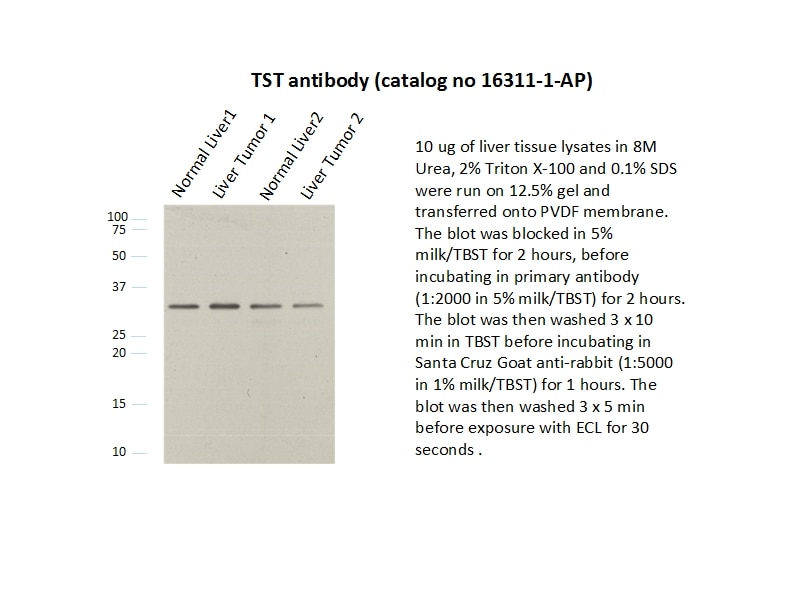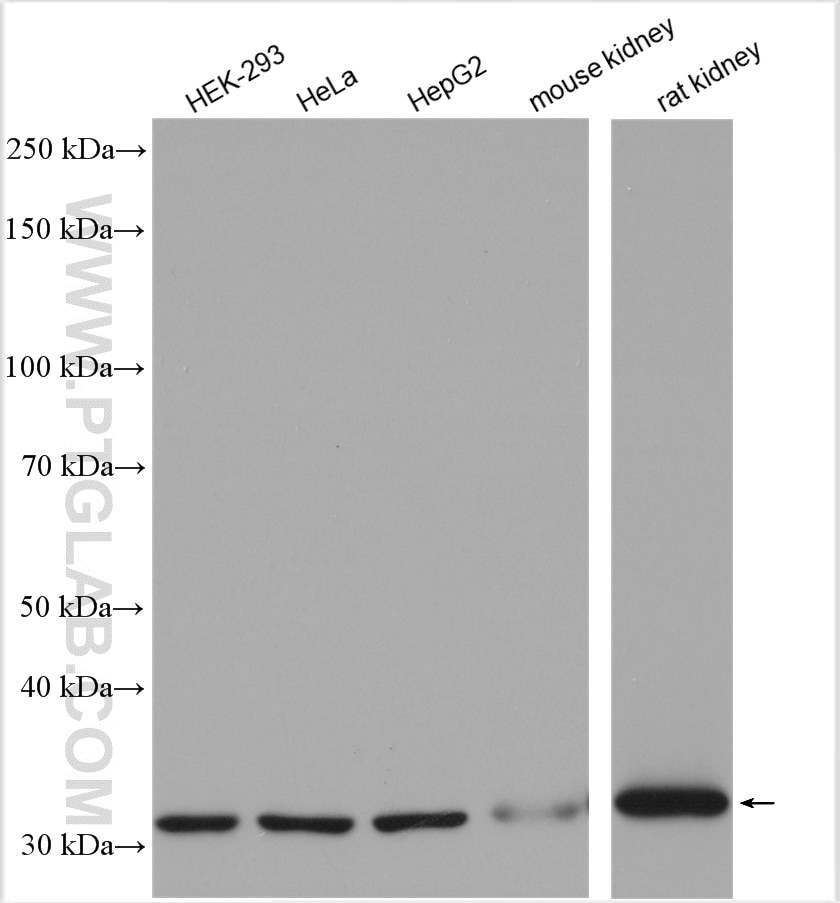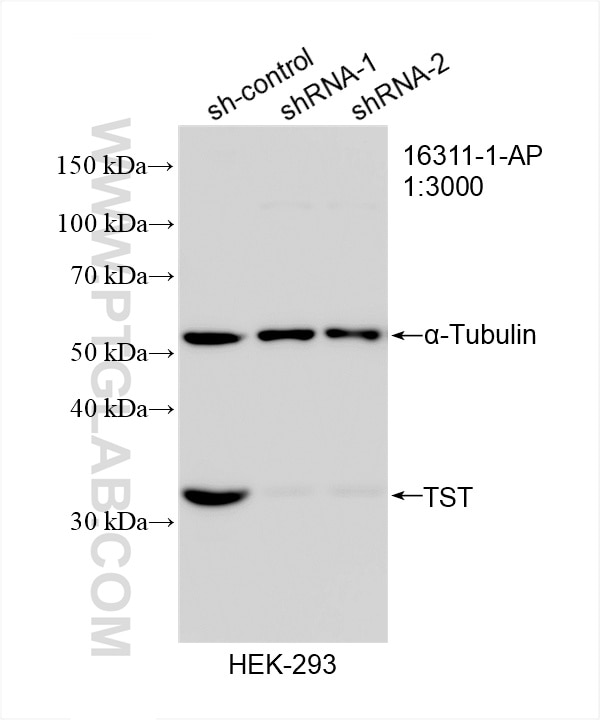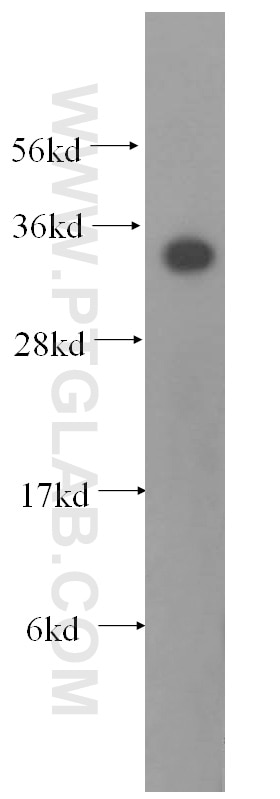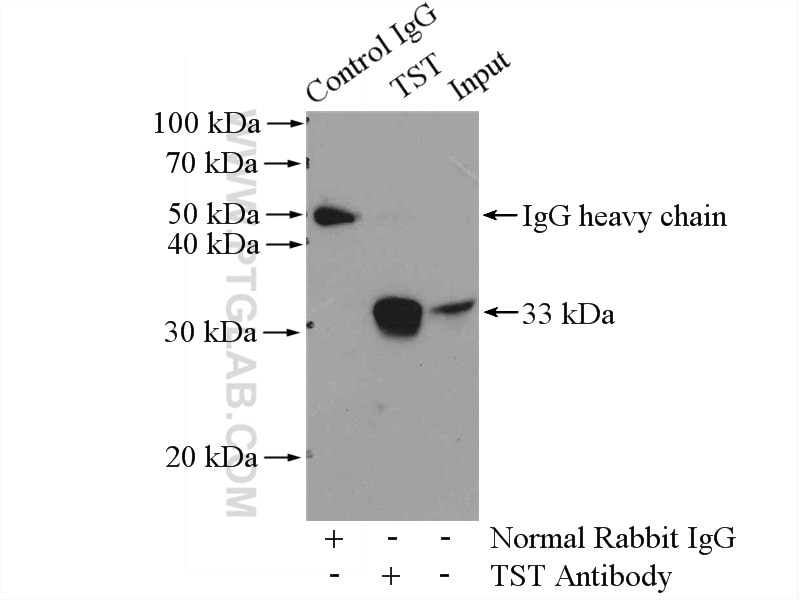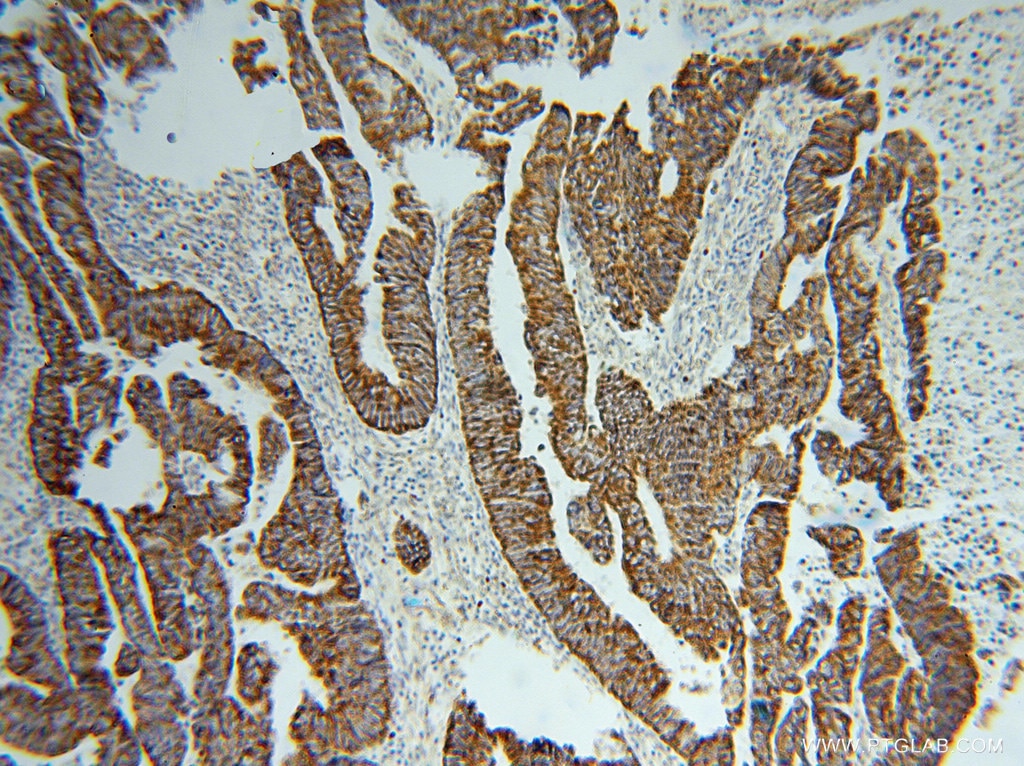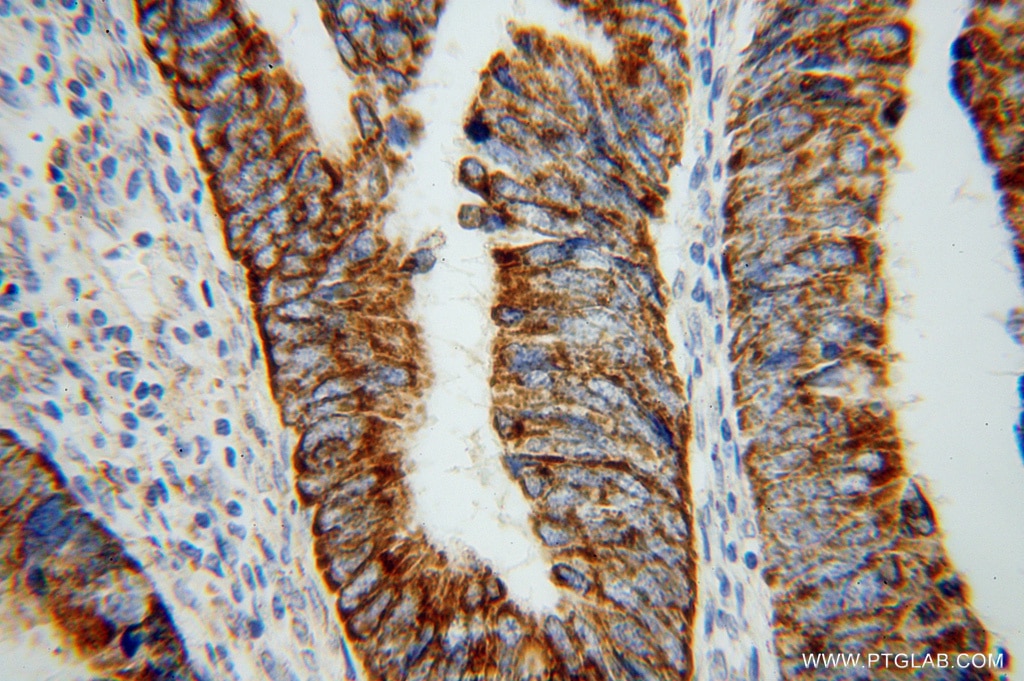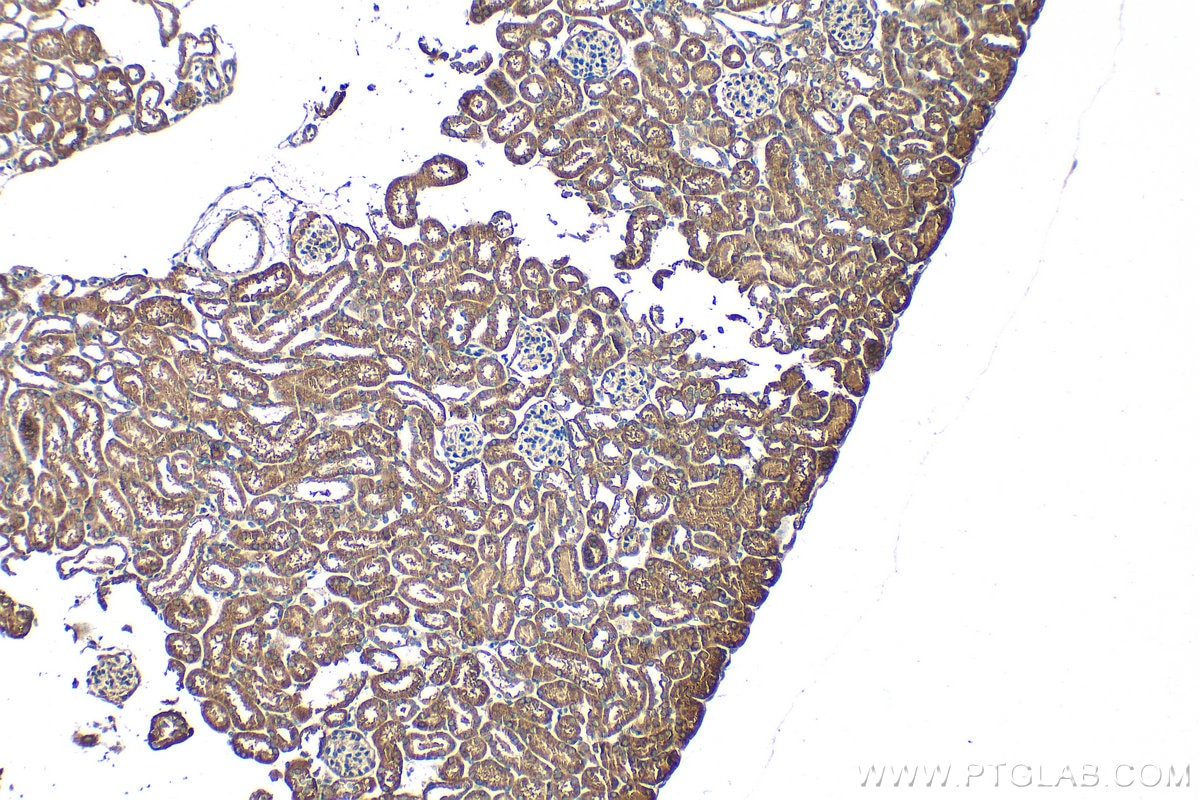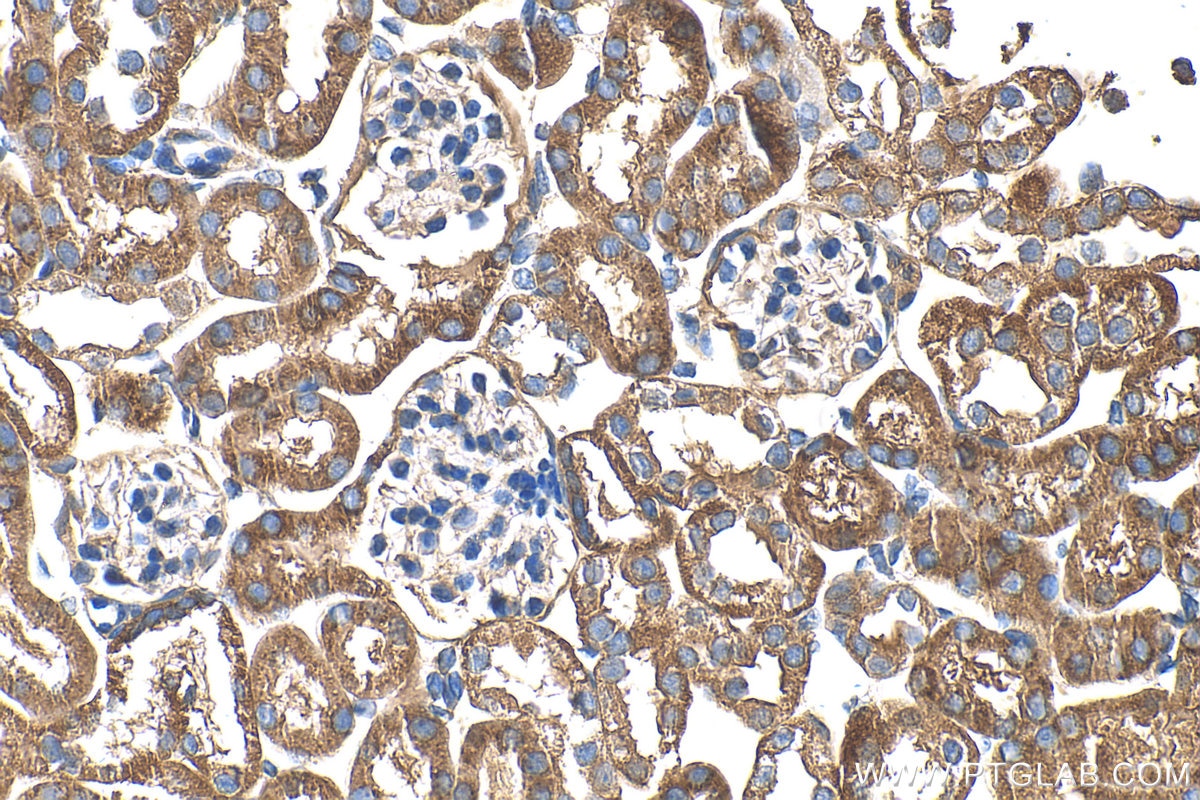- Featured Product
- KD/KO Validated
TST Polyklonaler Antikörper
TST Polyklonal Antikörper für WB, IHC, IP, ELISA
Wirt / Isotyp
Kaninchen / IgG
Getestete Reaktivität
human, Maus, Ratte
Anwendung
WB, IHC, IP, ELISA
Konjugation
Unkonjugiert
Kat-Nr. : 16311-1-AP
Synonyme
Geprüfte Anwendungen
| Erfolgreiche Detektion in WB | HEK-293-Zellen, HeLa-Zellen, HepG2-Zellen, humanes Nierengewebe |
| Erfolgreiche IP | HEK-293-Zellen |
| Erfolgreiche Detektion in IHC | humanes Kolonkarzinomgewebe Hinweis: Antigendemaskierung mit TE-Puffer pH 9,0 empfohlen. (*) Wahlweise kann die Antigendemaskierung auch mit Citratpuffer pH 6,0 erfolgen. |
Empfohlene Verdünnung
| Anwendung | Verdünnung |
|---|---|
| Western Blot (WB) | WB : 1:1000-1:8000 |
| Immunpräzipitation (IP) | IP : 0.5-4.0 ug for 1.0-3.0 mg of total protein lysate |
| Immunhistochemie (IHC) | IHC : 1:20-1:200 |
| It is recommended that this reagent should be titrated in each testing system to obtain optimal results. | |
| Sample-dependent, check data in validation data gallery | |
Veröffentlichte Anwendungen
| WB | See 9 publications below |
Produktinformation
16311-1-AP bindet in WB, IHC, IP, ELISA TST und zeigt Reaktivität mit human, Maus, Ratten
| Getestete Reaktivität | human, Maus, Ratte |
| In Publikationen genannte Reaktivität | human, Maus |
| Wirt / Isotyp | Kaninchen / IgG |
| Klonalität | Polyklonal |
| Typ | Antikörper |
| Immunogen | TST fusion protein Ag9346 |
| Vollständiger Name | thiosulfate sulfurtransferase (rhodanese) |
| Berechnetes Molekulargewicht | 297 aa, 33 kDa |
| Beobachtetes Molekulargewicht | 33 kDa |
| GenBank-Zugangsnummer | BC010148 |
| Gene symbol | TST |
| Gene ID (NCBI) | 7263 |
| Konjugation | Unkonjugiert |
| Form | Liquid |
| Reinigungsmethode | Antigen-Affinitätsreinigung |
| Lagerungspuffer | PBS with 0.02% sodium azide and 50% glycerol |
| Lagerungsbedingungen | Bei -20°C lagern. Nach dem Versand ein Jahr lang stabil Aliquotieren ist bei -20oC Lagerung nicht notwendig. 20ul Größen enthalten 0,1% BSA. |
Hintergrundinformationen
Thiosulfate sulfurtransferase (TST), also known as rhodanese, is a mitochondrial enzyme involved in cyanide detoxification and the formation of iron-sulfur proteins and the modification of sulfur-containing enzymes.
Protokolle
| PRODUKTSPEZIFISCHE PROTOKOLLE | |
|---|---|
| WB protocol for TST antibody 16311-1-AP | Protokoll herunterladen |
| IHC protocol for TST antibody 16311-1-AP | Protokoll herunterladenl |
| IP protocol for TST antibody 16311-1-AP | Protokoll herunterladen |
| STANDARD-PROTOKOLLE | |
|---|---|
| Klicken Sie hier, um unsere Standardprotokolle anzuzeigen |
Publikationen
| Species | Application | Title |
|---|---|---|
EMBO Mol Med CoQ deficiency causes disruption of mitochondrial sulfide oxidation, a new pathomechanism associated with this syndrome. | ||
Antioxid Redox Signal The Cysteine Dioxgenase Knockout Mouse: Altered Cysteine Metabolism in Nonhepatic Tissues Leads to Excess H2S/HS(-) Production and Evidence of Pancreatic and Lung Toxicity. | ||
Hum Mol Genet Coenzyme Q10 modulates sulfide metabolism and links the mitochondrial respiratory chain to pathways associated to one carbon metabolism. | ||
Biochem Pharmacol Cystathionine-γ-lyase (CSE) deficiency increases erythropoiesis and promotes mitochondrial electron transport via the upregulation of coproporphyrinogen III oxidase and consequent stimulation of heme biosynthesis. | ||
Amino Acids Primary hepatocytes from mice lacking cysteine dioxygenase show increased cysteine concentrations and higher rates of metabolism of cysteine to hydrogen sulfide and thiosulfate. |
